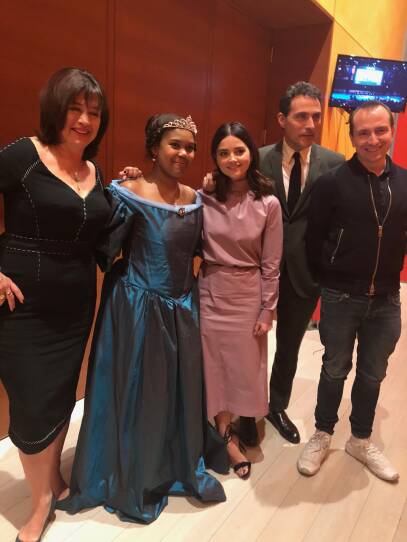While most fans of British television only pay attention to the actors, and occasionally directors or writers, it’s worth noting the rest of the credits. Executive Producers play a huge role in setting the tone of a story and oversee critical components of shoots before, during and after filming. Once you start seeing the same names and company logos, you’ll notice individual and collective styles, specialties, and patterns of career growth over time.
For instance: if you looked at the credits of MASTERPIECE’s World On Fire and the 2004 Marple adaption, or BritBox’s new thriller Code of Silence, one name, and one UK production company, keeps popping up: Damien Timmer and Mammoth Screen. Timmer founded the company in 2007, but has worked on UK TV as an Executive Producer since 1997. His television credits cover everything from cozy mysteries like McDonald & Dodds, to sweeping period dramas like the never aired or streamed in America The Singapore Grip, to the bold Afrofuturist dystopia sci fi series Noughts + Crosses and many more in between.
GBH Drama initially interviewed Damien Timmer to get a sneak peek at Towards Zero and MASTERPIECE’s upcoming new adaption of the J.G. Galsworthy’s Victorian epic The Forsytes novel, but we ended up with an in-depth look at how the process of bringing your favorite series to life has changed over the course of Timmer’s career.
GBH Drama: How has TV production changed from your very first series to now?
Damien Timmer: Every day for pretty much 30 years, every working day, one does what feels like the same thing. Yet incrementally over 30 years, the world of television has just changed beyond all recognition, several times probably. Of course, one doesn’t notice it day by day because one is still pretty much looking at a script that is 60 pages long. The shooting schedule is roughly similar to what it was before. The process of developing something — getting it commissioned, preparing to shoot it, shooting it, post-production — is the same, to all intents and purposes, but it feels like the very nature of TV production has completely changed.
When I started, writers would type their scripts and put them in the post and you’d have to wait to see when the scripts arrived in the mail room. That feels like a very different landscape to the world we are now operating in; it was all about the overnight. People would video shows and watch them but when you were looking at the ratings of a show, that was never taken into account. Now of course, we are in a completely different universe where something like Code of Silence or Towards Zero, the tale of that show is such that overnight rating is just the very beginning of what you know is going to be a journey that can last years.
Costs have spiraled, not just because of inflation, but for lots of complicated reasons. When these shows become more ambitious, funding them becomes more challenging. One is very aware of operating in an international market and having to satisfy viewers all over the world who have so many choices. One has to work really hard to make the thing one is working on feel properly... to make sure that the proposition of the show you are making is as commanding as possible, if that makes sense.
GBH Drama: How would you say the British TV audience, network executive, and screenwriter perspectives have changed over the years?
Damien Timmer: If you make a lot of television programs over a period of time, you are having a dialogue with yourself about the shows you’ve made before. You are trying to consciously and unconsciously keep things fresh, and you are reacting to the world around you in so many ways that you are not even aware of. When I started out, television was very different. I would argue it was much more hierarchical. Writers tended to be older. There were a lot of writers working back in the day but it was slightly more of a closed shop. As the years roll on, I think that broadcasters have become much more relaxed about who tells stories. We are now able to work with much younger writers. I wasn’t even necessarily aware of it 30 years ago when I started, but the bulk of stories were told by male dramatists of a certain age — and a certain life experience. That has slowly changed. It’s one of those things, one’s not aware of the change on a day-by-day basis but I look around now and I look at broadcasters channels, their enthusiasm to tell a wider variety of stories from a wider pool of writers has led to a lot of very exciting opportunities in recent years. That impacts massively on what shows we make. One is aware now of making shows for so many different outlets. There’s so many different buyers. They all want to find a point of difference, and there is much more freedom to tell, I’d think, a wider range of stories. That has been one of the big significant changes during my career.
GBH Drama: Was there ever a production you really wanted to happen but it fell through? I’m thinking of the failed “darker Pride and Prejudice” circa 2017, for instance.
Damien Timmer: I can’t think of one particular thing. I can think of a dozen sad things; scripts that one loved and tried so hard to get away and couldn’t get away. It would be… just as it feels unfair to favor one child.
GBH Drama: Mammoth Screen is best known for limited series, or miniseries. Was specializing in that television format something that was forced or happened naturally?
Damien Timmer: As a production company, one is always at the mercy of what people want to commission from us. It has really helped us build a robust business to be able to have these big bank returning series like Endeavor, and those five series of Poldark, and these various Agatha Christie titles. It is hugely helpful to us as a company to have that bedrock. It’s really difficult to make a standalone show. It’s hard to fund, it’s hard to get the timing of it right, and it’s hard to sustain a company when there’s so many unknowns. And it is great for us, for any company, to have some hardy perennials. They’ve all been shows that we’ve loved. I think it would be hard to have a show that returned year after year if it wasn’t something you loved.
I think for the audience to love it enough for it to return, I think the chances are you have to love it as the producer. We’ve always enjoyed having the variety of a show like Victoria that returned and a show like Parade’s End, which we made with HBO and the BBC, which was only ever going to be five hours, but adapted by Tom Stoppard and a complete delight in a very different way. So we have enjoyed standalone single films and we’ve loved our returning series. In truth, we love the variety. Everything we do is bespoke. It’s made by a team. Every show is made by a unique team of people who are coming together for the first time. We’re often filming in new places. You have new funding models, new partners coming together. So every time we make a drama, we are doing something new, as far as we are concerned.
It would be much easier to have a very industrialized process where we were just making one drama every year, year after year, in a certain way. I think we’d get incredibly bored, and the delight of what we’re doing is that every single thing, whether it’s a new Agatha Christie or a new period drama or a new contemporary thriller, they are all new production models for us.

GBH Drama: Do you have a favorite genre you particularly like to work with?
Damien Timmer: I really do like variety, and because we’re always working on multiple projects, I might spend my morning doing a costume drama and worrying about bonnets or hats or wigs, and then the afternoon worrying about a car chase in a contemporary thriller, and I love that. I guess for all of us as producers, you work with what you have. I’m not aware of switching hats as I go through my working day. I find things that are interesting in everything we make and I genuinely enjoy the variety.
GBH Drama: What was your most technically or logistically challenging production to get off the ground?
Damien Timmer: The Serpent on Netflix was many years in the making. We filmed in Thailand. We had to flee Thailand as Covid started. We had to pick that show up many months later, in a rather unlikely part of England to finish, and filming in locations that were supposed to be Thailand, Nepal, India, and Paris, so that was difficult. Some shows come together very quickly and smoothly. I don’t think anything is easy, but some things are certainly easier than others. You can have a project that you love with all your heart but it can sometimes take 5, 6, 7 years between having the idea, or meeting a writer who has an idea, getting that first script, and actually making the show. We have things at the moment that we are about to start filming. I think of one in particular that has been a real passion project of ours, it must have been five or six years in the making. I think you have to be very good at being very patient. If you were not patient, you would not enjoy making TV drama.
GBH Drama: Where do you see the TV industry going in the next five, ten years?
Damien Timmer: The pleasing thing about television is everything is different and everything is the same. We are all constantly trying to make things that we find interesting that are challenging ourselves in different ways. The world is changing at this dizzying speed, and the way the global market works is constantly shifting. So all the years I’ve been making TV, we’ve been in a state of flux.
I feel one would… not that one would go mad if one tried to predict new trends, I just don’t know if that would ever really amount to anything. Every new idea, it’s a blank slate. It’s a new start. It’s a small step into the unknown. In lots of ways, I’m sure in 10 years time, the TV landscape will feel similar to today, and yet I’m sure it will also be completely different. We will, as drama makers, we will all be trying to innovate. We will be trying to work with emerging talent, trying to break emerging talent. We will be trying to, as ever, find a new version of period drama that holds a mirror up to us and really an audience falls for. We will be continuing to try and find that new contemporary thriller that feels unexpected and original.
I am absolutely certain that the global appetite for drama is going to increase. We’re all aware as drama-makers that we are now working not just for a domestic audience, we’ve been making shows for an international audience for a very long time. I think one is really aware now though of quite how much enthusiasm there is for drama across the world, and I think we’re all aware that drama endures, and that the hit dramas of today are things that will still have a life and a currency in 10 years time. It’s that combination of trying to find with each new show, gently stimulating the debate; just testing the water with a new twist on something. The world of drama just keeps on changing.
NOTE: This interview will be the last update from me on GBH Drama due to the impending federal funding loss. You can help by sharing your favorite articles and interviews, donating to GBH or your local PBS Station, and by following the Protect My Public Media campaign. I’d like to thank all of our readers, everyone who we’ve interviewed and featured, and our industry friends at MASTERPIECE, BritBox, AcornTV, Amazon Prime and Hulu who have supported this coverage!
Amanda-Rae





